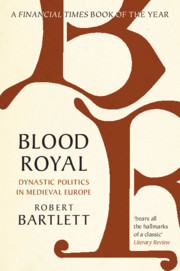Book contents
- Blood Royal
- The James Lydon Lectures in Medieval History and Culture
- Blood Royal
- Copyright page
- Dedication
- Contents
- Figures
- Preface and Acknowledgements
- Abbreviations
- Introduction Royal Families
- Part I The Life Cycle
- Chapter 1 Choosing a Bride
- Chapter 2 Waiting for Sons to be Born
- Chapter 3 Fathers and Sons
- Chapter 4 Female Sovereigns
- Chapter 5 Mistresses and Bastards
- Chapter 6 Family Dynamics
- Chapter 7 Royal Mortality
- Part II A Sense of Dynasty
- Book part
- Notes
- Bibliography of Works Cited
- Index
Chapter 6 - Family Dynamics
from Part I - The Life Cycle
Published online by Cambridge University Press: 09 July 2020
- Blood Royal
- The James Lydon Lectures in Medieval History and Culture
- Blood Royal
- Copyright page
- Dedication
- Contents
- Figures
- Preface and Acknowledgements
- Abbreviations
- Introduction Royal Families
- Part I The Life Cycle
- Chapter 1 Choosing a Bride
- Chapter 2 Waiting for Sons to be Born
- Chapter 3 Fathers and Sons
- Chapter 4 Female Sovereigns
- Chapter 5 Mistresses and Bastards
- Chapter 6 Family Dynamics
- Chapter 7 Royal Mortality
- Part II A Sense of Dynasty
- Book part
- Notes
- Bibliography of Works Cited
- Index
Summary
This chapter deals with family dynamics other than the father-son relationship. In the early middle ages, and in some parts of Europe later than that, the claims of younger sons could be met by dividing the kingdom, and some of these divisions marked European history ever after (the consequence of the Treaty of Verdun are discussed in detail). But once unitary succession had been established in the major kingdoms, as it was by 1100, kings had either to remove their younger brothers by force or devise ways of satisfying their ambitions. This could sometimes be done by giving them apanages, portions of the royal estate, but this presented the problem of reintegrating them. Kings also faced ambitious and sometimes ruthless uncles. Cousin conflict could become lethal, as in the conflict between France and Burgundy. The later part of the chapter discusses issues around queens consort: their vulnerability to charges of adultery, their complex relations with their sons, and the role of royal stepmothers.
Keywords
- Type
- Chapter
- Information
- Blood RoyalDynastic Politics in Medieval Europe, pp. 187 - 239Publisher: Cambridge University PressPrint publication year: 2020

